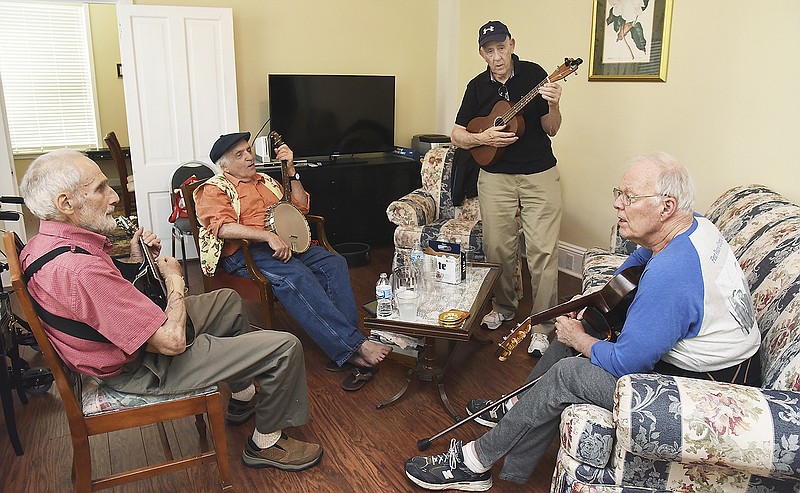Four men who set out to change the world nearly 60 years ago gathered in Jefferson City this week to reminisce and play folk music.
The men were members of the first wave of young adults sent overseas as part of the Peace Corps, created by John F. Kennedy shortly after he became president.
Lenny Bloom, now 77, said he and his colleagues had become bored or disenfranchised with the status quo in Washington. They felt like they didn't have much of a voice. During a campaign speech to University of Michigan students in the middle of the night, Kennedy challenged them to contribute two years of their lives to helping people in developing countries.
That was the beginning of the Peace Corps, said Peter De Simone, 80, of Jefferson City.
They came from different backgrounds. De Simone had attended the University of Connecticut; Bloom, City College of New York; George Johnson, 80, Princeton; and Burton Segall, 84, the Polytechnic Institute of Brooklyn, University of North Carolina and New York University.
"It was our job to save the world," De Simone said. "I got bored working for the New Haven Railroad. And we were adventurous."
The quartet was among groups of engineers, surveyors and geologists sent to Tanganyika (which later became Tanzania) to build sustainable infrastructure.
The region was poorly affected by the end of British colonial rule, Bloom said.
"There were no highways or year-round communication," he said. And with the British gone, "There were no doctors, lawyers, engineers or other technical people."
On top of that, the period in East Africa was "turbulent," Segall said.
Segall said he was about 80 miles from the capital, in the Morogoro region, where he was in charge of construction of large road and highway projects.
Johnson was an engineer in charge of a project in the far southern province within the country. That province was often cut off from the rest of the country by a river that continuously washed away bridges. His responsibility was to build a road to a part of the province where the river was more "bridgeable."
The men didn't work together in Africa. However, the Peace Corps sponsored reunions on significant anniversaries. The men met at events such as the 10th or 25th anniversaries. And they found they had in common a love of folksy music.
"(Eventually) a guy in our group who is very energetic organized reunions of our Tanzania group," Johnson said. "The four of us liked it and had our own."
Segall began inviting the men to his home in Cape Cod, Massachusetts.
"Folk music was the popular music in the United States," Bloom said. "There were so many tunes that were familiar."
Each of the men picked up instruments. De Simone plays acoustic guitar. On Tuesday, sitting in the High Street Retreat on East High Street in Jefferson City, where the men met on the 57th anniversary of their foray into the Peace Corps, he played a mandolin. Their wives left them alone in the afternoon to enjoy their activity together.
Johnson strummed an acoustic guitar, Bloom broke out his banjo and Segall stood alongside playing the ukulele.
"Music, as we became older, has become more and more an important part of our lives," Bloom said. "It's deeper than camaraderie - it's an affection."
Folk music, in particular, is meaningful to the men, Segall said. It represents issues that were important to them nearly 60 years ago, and it represents that time that was important to them.
Kennedy's inaugural address also remains inspirational for him today, Bloom said.
"Ask not what your country can do for you - ask what you can do for your country," he said as his bare feet tapped out a rhythm on the hardwood floor. "And that Kennedy election campaign represented a sea-change in culture. He was an admirable speaker and thoughtful guy."

